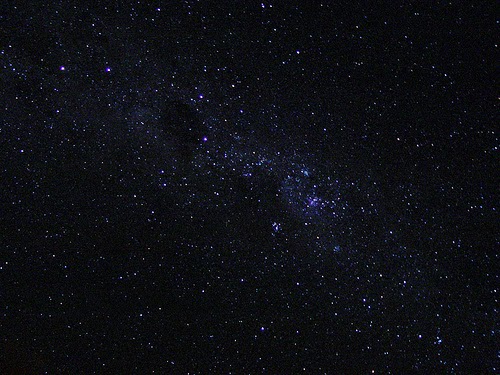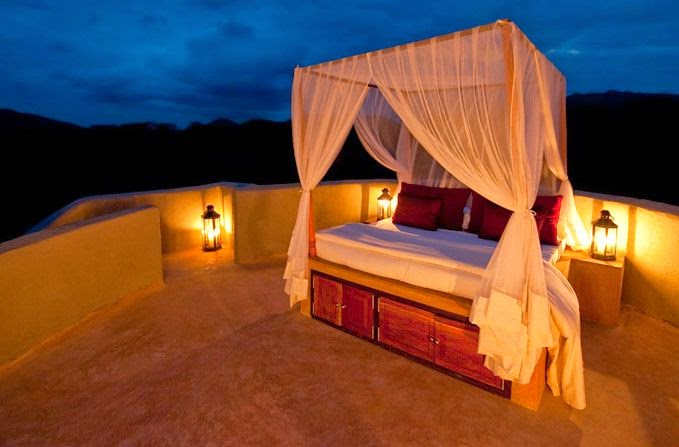Star quality
A day spent in East Africa is always a treat for the eyes. Vast sweeping landscapes, an abundance of animal life and vividly colourful cultures make this a land of visual delights. But when the sun sets after a day out on safari, it doesn’t mean the spectacle is over. Look up and you’ll see another, less obvious one of Africa’s beautiful sights – an utterly bewitching night sky.
If you’re among the majority that live in an urban area, a clear night probably means a pleasantly starry skyward view but one whose brilliance is dampened by the inevitable light pollution of city living. Out on camp in the African bush, it’s a strikingly different scene. Tilt your head to the heavens here and you’re met by a teeming sea of sparkling lights. Stars, planets, clusters and nebulas are all on show, vying for your attention.
A starry sky (© Damien du Toit)
Clear air and remote locations away from artificial light make an East Africa safari the ideal opportunity to indulge in some stargazing. What’s more, the near-equatorial location means that night falls early in the day all year round. So wherever you are out in the African wilds, after a thrilling day of safari, you can lie back and enjoy the unique peace and awe of surveying one of the most dazzling night skies you could hope to see.
Even as a straightforward admirer, stargazing out in Africa is an extraordinary pleasure. But for the amateur astronomer, the sky here holds even more fascination. If you’re accustomed to seeing the stars from a higher latitude, a vantage point near the equator in Kenya brings the novelty of being able to spot stars and constellations of both celestial spheres from a single location.
Setting your sights high
While there’s great pleasure to be had from simply gazing skyward at night when you’re out in Africa, if you want to optimise your astronomical appreciation while you’re here, it can pay to think ahead.
Firstly, it’s worth bearing in mind that the moon cycle plays a significant part in how dark the sky will be and therefore how much you can see. While a full moon is a beautiful celestial phenomenon to enjoy in its own right, and can be desirable for some night-time activities in Africa (such as an atmospherically lit mountain climb), it’s not an ideal condition for star spotting. Gazing at the night sky is far more fruitful during a new moon (you can see the moon cycles for the rest of 2014 here).
The ‘starbed’ at ol Donyo
Some camps and lodges are specially geared up for stargazers. For example, ol Donyo lodge offers rooftop ‘starbeds’ (pictured, right), which afford the romance of contemplating the night sky right from the comfort of your bed as you drift into slumber. Others, such as Mahali Mzuri, have installed a telescope on camp, for a closer examination of the heavens. Even if your accommodation doesn’t come ready equipped, a good pair of astronomy binoculars is an invaluable and portable tool you can take to enhance your viewing.
Whether you’re interested in the stars and planets from an astronomical perspective or you simply admire the vast and infinite beauty of the sky at night, East Africa is certain to inspire awe after dark. So when you’re relaxing and reflecting after a day of thrills and adventure out in the African wilds, don’t forget to look up for yet another facet to this region’s beauty.
Chasing Shadows in Laikipia – The Melanistic Leopard of Ol Doinyo Lemboro Ranch
The relatively recent emergence of a Black Leopard in Laikipia, Kenya has wildlife photographers and the social media world dizzy with excitement. In September, we travelled up to Laikipia to search for the majestic beast for ourselves! What is a Black Leopard and...
Sublime safari adventures at Sirikoi
Those who prefer their travel experiences to be cushioned in luxury might suspect that an African safari is a few thousand miles from their comfort zone. But Sirikoi is no ordinary safari camp. Despite its phenomenal location in Kenya’s Lewa Conservancy – 68,000 glorious acres of African wilderness – there’s no compromising on the finer things.

Get our e-newsletters
Africa House Ltd, P.O. Box 1751, Nairobi, 00502 | T: +254 (0) 722 512 588 | E: info@africahousesafaris.com |© 2024 Africa House Safaris. All rights reserved.




